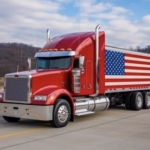In today’s market, many companies must transport goods from one location to another, such as from a warehouse to a retail sales storefront. Still, they cannot afford to buy a commercial truck outright. For some, the answer is to hire outside help to haul their goods back and forth. But to save money and ensure that the job is done correctly, the best option is always to do it yourself (so to speak.)
That is where commercial truck rental or commercial truck leasing comes into play. But to decide which direction is best for you and your business, it is imperative to understand which option would be best for you and your business. So, let’s take a little deeper look into each of them so you can make a better-informed decision.

Commercial Truck Leasing
First things first, you need to know the definition of commercial truck leasing:
- Commercial truck leasing is a long-term solution for a company when they need a vehicle, or vehicles, for a month or two or even a year at a time.
For example, commercial truck leasing would be used for a company that operates commercial trucks regularly to keep its business running smoothly, such as a manufacturing company that sells a product to a retail store at wholesale prices. That is not to say that this type of business would be the only one in need of such a service, but it is one of many that needs to have some kind of shipping program in place to stay profitable.
Commercial truck leasing can alleviate a substantial amount of the stress associated with buying and maintaining your own fleet of commercial trucks. It is similar to leasing a personal car but for your business needs. Depending on your business needs and expenses, buying your own trucks may never be feasible, so make sure you crunch some numbers before considering doing anything other than leasing your commercial trucks.
Commercial Truck Rental
The definition of a commercial truck rental is a little bit different:
- Commercial truck rentals are short-term solutions when you need a vehicle for a day or two or even a week.
For example, commercial truck rentals would benefit a small company that takes special orders for a specific product, such as high-end furniture. In this case, the only time that a piece of furniture would need to be shipped is when a special order came in, so there would not be a need to keep a truck ready to go at all times. A commercial trucking lease can be signed once the business grows and that point is reached.
After that, as the business grows, you can look into buying a truck or two but never go out and start big when you can go small and work your way up. This strategy will keep you from spending too much money on something you do not need right up front, keeping business expenses down and profit margins up.
Final Thoughts
The difference between commercial truck leasing and commercial truck renting is simply the amount of time each offers and the cost. Keep in mind that when you go for short-term renting rather than long-term leasing, you will be asked to pay more money. It works like a credit card company that makes money from the interest it tacks on.
The rental truck company will add on extra fees for carrying a rental contract for a short period of time, while a company that is leasing the trucks to you will not include hefty fees because they know that they will have long-term income coming in from your payments. It is a win-win for both of you if you lease rather than rent.








